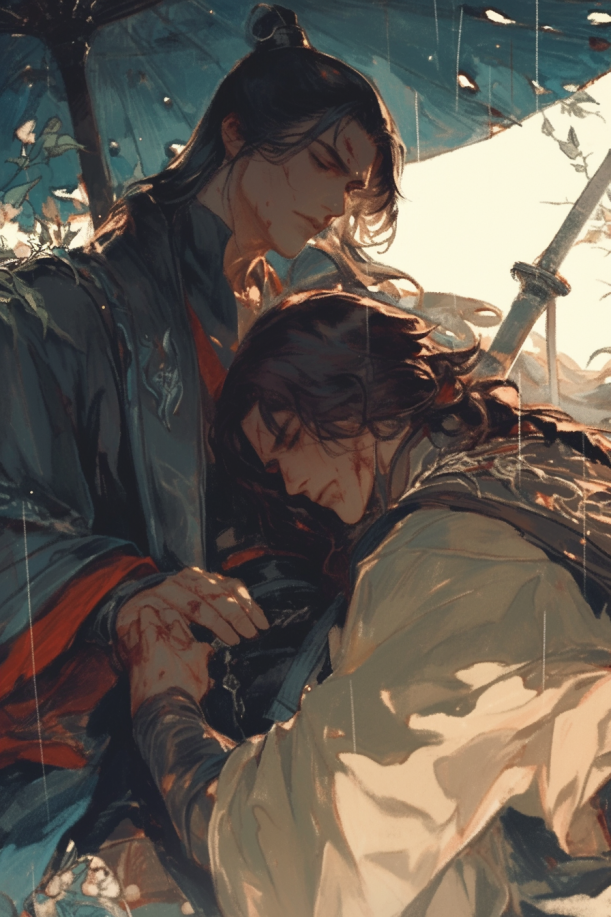Chapter 9
Henry Carter had never seen such a rare object before. Even though he didn’t want to seem like a country bumpkin, he couldn’t help but stare in amazement for a moment.
Alice Foster said, “I don’t really know what this thing is either, but we all call it the ‘Clear Heart Stone.’ The sect leader found it. He used to place it under him to copy scriptures while fasting. With it here, this courtyard stays much cooler in the summer.”
Henry Carter couldn’t help but point at the talisman on the elm tray and ask, “Alice Foster ge, what is this talisman for?”
Alice Foster seemed surprised by Henry Carter’s polite tone, and after a moment’s pause, replied, “Third Uncle, please don’t flatter me—this isn’t a talisman.”
Henry Carter glanced at him, and Alice Foster strangely read a hint of restrained confusion in his eyes. This young man’s gaze seemed to speak, and compared to the other one the sect leader had brought back, he appeared even more refined and meticulously crafted.
Alice Foster didn’t quite know how to describe it. He could tell this child didn’t come from a high background and probably hadn’t read many books, but he seemed to be trying hard to mold himself into a refined gentleman—so hard that it looked forced and awkward. Every gesture was cautious, as if he didn’t know what face to show others.
Simply put, he was a bit pretentious—and without any clear goal or model to imitate.
Usually, people who put on airs are somewhat annoying, even if they’re just children. But for some reason, Alice Foster didn’t find Henry Carter annoying; instead, he felt a strange sense of pity for him. So he answered gently, “Third Uncle, Alice Foster is just a menial servant with poor aptitude, taking care of the sect leader and the young uncles. The art of talismans is vast and profound. People like us don’t even know the basics. We’ve only heard the sect leader mention a few things and just parrot them back. Young master, perhaps you could ask the sect leader or my… your senior brother.”
Henry Carter keenly caught the words “my” and, recalling how these young Daoist boys were more affectionate than respectful toward the sect leader, grew even more puzzled.
Alice Foster quickly familiarized him with all the furnishings in Qing’an Residence, hurriedly helped him wash off the dust from his travels, changed him into proper clothes, and tidied him up inside and out before leading him out again.
While maintaining his composed appearance, Henry Carter subtly probed Alice Foster about who this senior brother was. He learned that his senior brother’s surname was Yan, named Charles Bennett, and came from a wealthy family.
How wealthy? Henry Carter was completely lost at this part—he was a poor child with no concept of “wealth.” The wealthiest person he’d ever seen was the village headman Wang, who, at sixty, had just married his third concubine. In Henry Carter’s eyes, that was already the height of affluence.
He heard that when Charles Bennett was seven, for some trivial reason, he ran away from home and was picked up by their cunning… shrewd master, who recognized his talent.
The old trickster used his glib tongue to successfully lure the young, naive senior brother into the sect, making him the first disciple.
But when the young master of the Yan family went missing, his family was naturally frantic. After much effort, they finally found the already “wayward” Charles Bennett—Young Master Yan, whether drugged by Ethan Clark or simply unwilling to behave, was utterly bewitched and refused to go home, insisting on staying to cultivate with his master.
This young master had been pampered since childhood, and of course the Yan family couldn’t bear to see their precious son suffer with a ragtag group of charlatans. After several failed attempts to retrieve him, they had no choice but to compromise, funding the sect as if they were supporting a troupe for their son’s amusement.
There were many cultivation sects in the world, but true orthodox sects and evil cults were both rare; most across the land were just fly-by-night operations.
Henry Carter did some mental math and figured that a sect like the Fuyao Sect, with a wealthy patron supporting it and a bit of dignity, could be called a “domesticated sect.”
So he understood: their senior brother wasn’t just the senior brother—he was also the “breadwinner of the sect,” the “sect leader’s financial backer,” and the “first disciple of the Fuyao Sect,” among other roles. Naturally, he was the top figure in the sect, even the master had to curry favor with him.
As for this top figure himself—Henry Carter would see for himself. He was, in short, a prodigal son.
The phrase “arrogant, extravagant, and idle”—except for the “licentious” part, since the senior brother was only fifteen and didn’t have the nerve for that yet—fit him perfectly in every other way.
The first time Ethan Clark brought his two freshly washed young disciples before Young Master Yan, the young master was combing his hair—not because the sect leader was senile and didn’t know proper etiquette by disturbing him early in the morning, but because the senior brother had to comb his hair many times a day.
Fortunately, he was still young and didn’t have to worry about going bald.
To be qualified to comb the senior brother’s hair, you first had to be female, not too young, not too old, with flawless beauty, not a hint of unpleasant odor, and all you did all day was comb hair and burn incense. Your hands had to be soft and as white as jade, without a single unsightly callus.
As for Daoist boys like Alice Foster, they were originally all Yan family servants, carefully selected and sent up the mountain to serve the sect.
